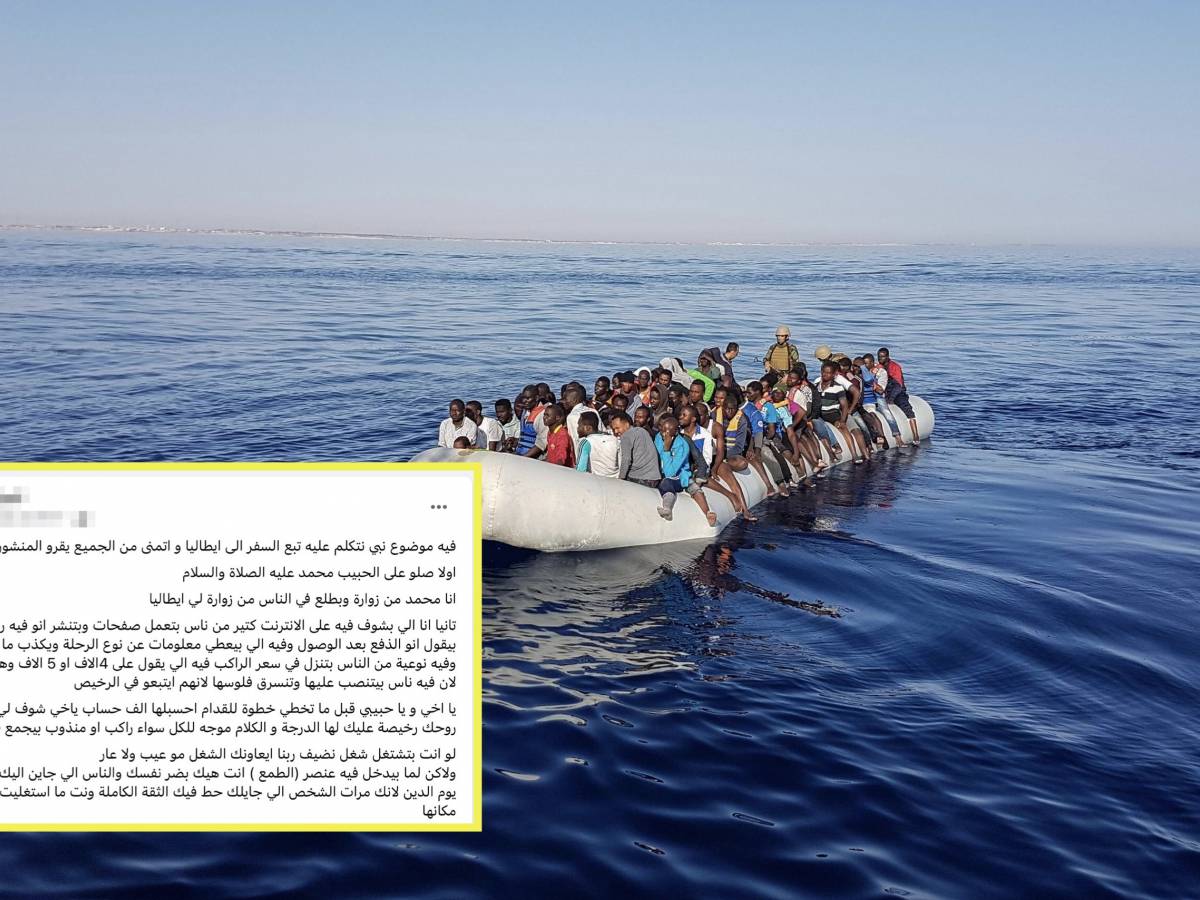What are the travel conditions that i irregular migrants do they accept to board small boats bound for Italy? Definitely, an important outlay of money, as evidenced by the testimonies of those who tell their experiences once they arrive in Italy. As we have been able to confirm by scrolling through the chats of the facilitators to which we have had access, there are several pricing policies which are applied to “convoys” crossing the Mediterranean: there are those who keep prices low but overload the boats, those who propose “elitist” solutions with few migrants on board but higher prices. Then there are those that include lifesaving devices in the price, such as inner tubes (cheaper) or life jackets which, however, in most cases require an additional outlay. During our research we intercepted the profile of a Libyan facilitator, who with a long post explained, from his point of view, the cost policy of the crossings.
His name is Muhammad and says he comes from Zuwārah, the city considered the hub of departures of migrants for our country. He publishes photos and videos of Milan in his profile: he is one of the subjects who organizes the “convoys” to Italy and in his message he warns migrants against those who, according to him, would only like to take the money without offering any services. “I see many people on the Internet who make pages and publish that there are flights, and there are those who say that the payment is after arrival. There are those who give information about the type of trip and lie about what is true“, explains Muhamad, according to whom a fare of 4-5 thousand Libyan dinars is excessively low due to the long journey and the risks looming over those making the crossing. And he denies the narrative according to which payment is made after the crossing, confirming that smugglers demand payment before embarking. He believes that “this thing is dangerous, because there are people who frame them and the they steal the moneythis is because they are looking for the least expensive“.
Evidently, he presents himself as a trustworthy and serious person to rely on to make the trip and his rates are much higher, just as proof of the fact that he cares, as he says in another post, “check everything” Why “it is not one of my characteristics to cheat“. Going back to the travels, he underlines that since they are travels by sea “there is no specific road to walk on and there is no gate to go through. It is not quiet, as if it were the desert, you head towards the desired place with compass and GPS and you have a phone Thuraya“. Then, he confirms that the migrants who are put on the sea carts are entrusted with a satellite phone, as is well known. And to justify his high tariffs, he gives some examples: “Imagine traveling 1,000 kilometers. I will give you the data of the means of transport used and the prices. Tell me what you choose: imagine you are in the desert, without protection, so they could attack you: bus, 20 hours and 10 dinars; car, 12 hours and 50 dinars; a fast car, 8 hours and 100 dinars; motorcycle, 5 hours and 150 dinars; plane, 2 hours and 1000 dinars“.
Recognizing that everyone chooses on the basis of their budget, ours says that whoever organizes the “convoys” does it to obtain a profit, therefore there is a lot of play on the price, often to the detriment of safety and, in some cases, taking advantage of those who give the his money to get the service: “You can take advantage by making a extra loadthus reducing the price a little to earn more, or you can increase the price and decrease the load, earning less“. Muhamad seems to prefer the second hypothesis, almost as if he wanted to build a reputation as a reliable person to justify his prices, which are around 9-10 thousand Libyan dinars, figures that are close to 2 thousand euros at the exchange rate. As a guarantee, he too, uses the presence of NGO ships in the Mediterranean, as indicated by a post reporting the presence of the Life Support vessel of Emergency off Libya in recent weeks. One of his recent announcements is aimed exclusively at Bangladeshi citizens departing from Libya but as a profile picture uses the image of the shipwrecked boat a few miles from Libyan waters, over which the dispute over the attribution of responsibility is ongoing.
